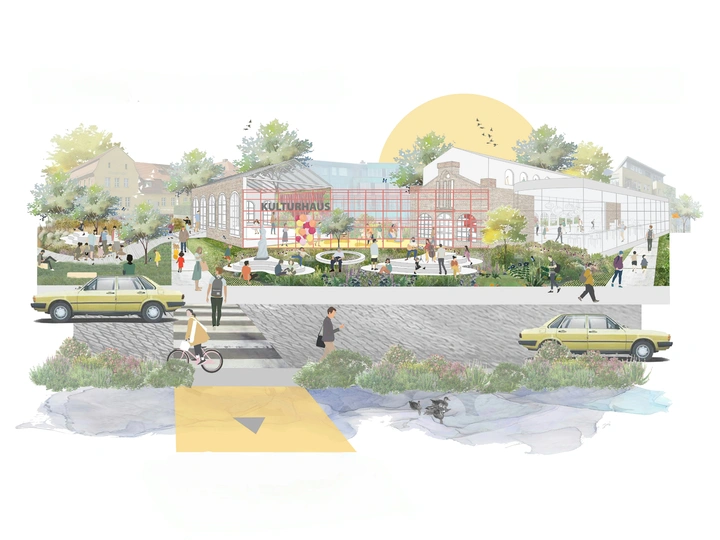Echoes of Time: Narratives in Derelict Spaces

Zeba Asad is an architect, visual storyteller, and researcher from Karachi, Pakistan, currently based in Germany. Her interdisciplinary practice weaves together architecture, illustration, and film to explore themes of spatial memory, adaptive reuse, and cultural sustainability. She completed her Bachelor’s in Architecture at the Indus Valley School of Art and Architecture in 2019 and was part of the team that represented Pakistan for the first time at the Venice Architecture Biennale in 2018.
Zeba’s research on the lack of common spaces in Karachi’s informal settlements investigates how spatial fragmentation and infrastructural neglect impact everyday life and social cohesion. Separately, her undergraduate thesis focused on the political and cultural complexity of the India–Pakistan border, reframing it as a space of opportunity and latent potential rather than mere division.
After graduation, she worked in architectural practice and freelanced on projects in Dubai and Australia. In 2022, she moved to Germany to pursue her Master’s in Architecture at DIA (Dessau International Architecture Graduate School), adjacent to the Bauhaus. Her thesis, Echoes of Time, explored abandonment and adaptive reuse as acts of cultural resilience, developed under the mentorship of Fredrik Skatar in 2024.
In 2023, she spent a semester at ARCHIP in Prague through the Erasmus programme, where she explored mobility in urban space and created the short film 'The Navigator', examining the psychological experience of navigating the city. She was also a finalist in the NEA Adaptive Reuse x Placemaking programme in 2023.
Zeba continues to explore the intersections of spatial justice, memory, and design through collaborative and research-based practices, engaging deeply with overlooked urban narratives.
Echoes of Time is a speculative yet practice-informed architectural proposal that reimagines derelict sites as living narratives—spaces where memory, decay, and future possibility coalesce. Grounded in critical inquiry into urban transformation, storytelling, and spatial memory, the project investigates how the architectural reuse of ruins can address contemporary environmental and social challenges through cultural activation and collective memory work.
The project was initiated from a deep concern with the growing presence of abandoned, decaying industrial structures in urban peripheries—spaces often dismissed as obsolete or beyond repair. These “vacant” sites, however, are saturated with historical and material memory. They bear witness to changing urban economies and ruptured social histories. Recognizing the ethical and cultural implications of erasure, The proposal advocates for urban regeneration that preserves the past while building new social and cultural futures.
Using Luckenwalde, a former industrial town, as a case study, the proposal employs multi-scale research and draws global comparisons—especially with South Asian cities like Karachi—to root its design approach in varied social and political contexts.
The proposal centers on adaptively reusing a derelict factory into a KulturHaus that balances memory and future aspirations. By creating distinct zones for gathering, connection, and nourishment, it fosters community collaboration, artistic expression, and sustainable use of neglected spaces.
The project excels in combining narrative design with ethical reuse, creating flexible spaces that invite community interpretation and ongoing adaptation.
This work is not a prescriptive blueprint but a framework for rethinking ruin, vacancy, and memory as design catalysts. It suggests that confronting the environmental crisis demands more than technological fixes—it calls for a cultural reckoning with the way we build, remember, and inhabit space.